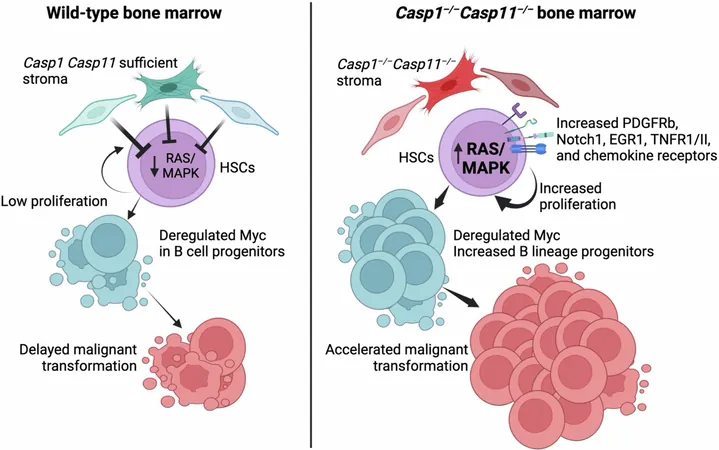
Groundbreaking Discovery: How Immune Proteins Could Prevent Cancer by Safeguarding Stem Cells!
2025-01-15
Author: Yu
Groundbreaking Discovery: How Immune Proteins Could Prevent Cancer by Safeguarding Stem Cells!
In an exciting development for cancer research, a preclinical study conducted by investigators at Weill Cornell Medicine has unveiled the protective role of immune proteins known as the inflammasome against malignancies in blood stem cells. This study, published in Nature Immunology, suggests that the inflammasome aids in removing specific receptors from stem cells' surfaces, which in turn suppresses the activity of cancerous genes. This discovery could pave the way for innovative therapeutic strategies that target the very early stages of cancer development.
The findings significantly enhance our understanding of the dual nature of the inflammasome. While it is commonly known for promoting inflammation linked to poor prognosis in advanced cancer stages, this study highlights its proactive role in preventing cancerous transformations in cells at earlier stages. “What was surprising was the innate immune system, which includes the inflammasome, has functions that extend beyond combating infections,” stated Julie Magarian Blander, the Gladys and Roland Harriman Professor of Immunology in Medicine and a member of the Jill Roberts Institute for Research in Inflammatory Bowel Disease at Weill Cornell Medicine.
The research team conducted their investigation using a mouse model known as Eµ-myc, which carries a mutation of the Myc oncogene linked to B-cell lymphoma. The design allowed scientists to observe the development of cancer over an extended period, providing insights into the initial phases of tumor formation. As B-cell lymphoma primarily originates in a particular type of white blood cell, the focus was directed toward their precursors—hematopoietic stem cells.
Intriguingly, modifications that disrupted inflammasome activity in Eµ-myc mice accelerated stem cell growth and tumor formation significantly. Furthermore, it was observed that stem cells in control groups, where the inflammasome was present, proliferated slowly compared to those lacking its activity, pointing to its crucial role in maintaining cellular health.
A key finding of the study highlighted the complex interactions between stem cells and their surrounding environment in the bone marrow stroma. The researchers discovered that in normal mice, the inflammasome helped regulate levels of soluble tumor necrosis factor (TNF) receptors shedding from stem cells, a process critical for maintaining cell proliferation balance. “It became clear that the inflammasome in the stroma performs a vital role by cleaving off TNF receptors from stem cells, thus preventing excessive cell growth,” Blander explained.
As research progresses, the team is eager to expand their inquiry beyond hematopoietic stem cells. Plans are underway to investigate the inflammasome's protective functions across different tissues while identifying which specific stromal cell types are key players in this process and the exact molecules involved in inhibiting cell proliferation.
The ultimate aim? To develop groundbreaking therapies that can delay or even prevent cancer before it takes hold. Blander emphasizes, “While a treatment could be designed to target the inflammasome, it’s critical that this focus remains on its inflammatory role implicated in tumor progression, safeguarding its beneficial aspects that counteract tumor development.”
This revolutionary discovery underscores a paradigm shift in cancer prevention strategies—could we be on the brink of a new era in protecting our cells from cancer? Stay tuned as we uncover more about this fascinating journey into the workings of our immune system!

 Brasil (PT)
Brasil (PT)
 Canada (EN)
Canada (EN)
 Chile (ES)
Chile (ES)
 Česko (CS)
Česko (CS)
 대한민국 (KO)
대한민국 (KO)
 España (ES)
España (ES)
 France (FR)
France (FR)
 Hong Kong (EN)
Hong Kong (EN)
 Italia (IT)
Italia (IT)
 日本 (JA)
日本 (JA)
 Magyarország (HU)
Magyarország (HU)
 Norge (NO)
Norge (NO)
 Polska (PL)
Polska (PL)
 Schweiz (DE)
Schweiz (DE)
 Singapore (EN)
Singapore (EN)
 Sverige (SV)
Sverige (SV)
 Suomi (FI)
Suomi (FI)
 Türkiye (TR)
Türkiye (TR)
 الإمارات العربية المتحدة (AR)
الإمارات العربية المتحدة (AR)